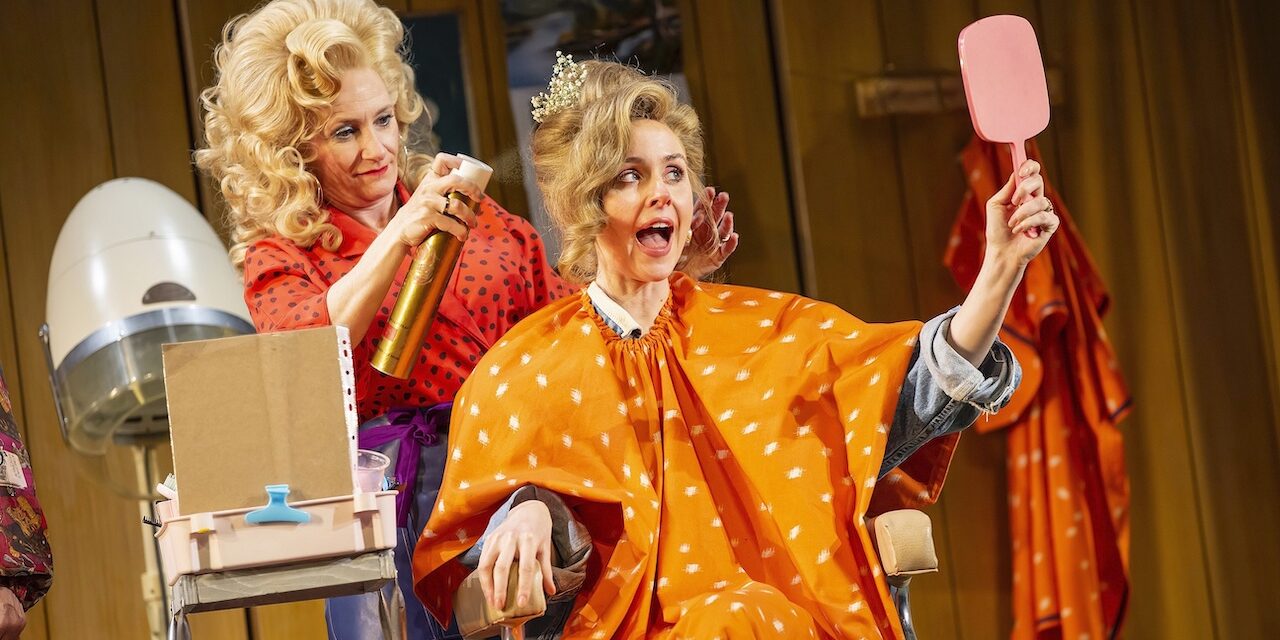
14 – 18 February
The advertising poster on the wall of the beauty salon reads, “The Higher the Hair the Closer to God”, a kind of self-mocking mantra which plays to a commonly perceived stereotype of southern ladies of the 1980s. With that in mind we can read Robert Harling’s play as a character sketch of a way of life and a culture unique to the southern states of America, in particular Louisiana where the play is set. Exploring the contradictions that an outsider finds bewildering, the good folk live their lives with something like a warm ironic detachment, as when Truvy (Lucy Speed) trying to help Shelby (Diana Vickers) with her marital wobble remarks on: “Good old southern values: shoot it, stuff it or marry it.”
The audience peers into Truvy’s beauty salon and using the salons’ mirrors the actresses reciprocate by peering back, and talk to each other via their supposed reflections. The salon acts for the regulars as we might expect of a pub or bar; it’s a place of friendship and gossip. Over a period of years, which is marked by changing hairstyles, the six characters are sketched in and rounded out. The chat is sharp and witty with the kind of edge that can only come with an easy familiarity. We feel we are eavesdropping on private conversations that hop around the stage and dovetail in a naturalistic way, which though interesting enough in themselves, nevertheless do not develop into any kind of plot or narrative sufficient to draw us in. The second act finally coalesces around the death of Shelby and a moving speech by her mother, M’Lynn (Laura Main) after her donation of one of her kidneys to her daughter failed to save her life. It is fine acting, touching and yet, given that it is an emotional island without a bridge or ferry from the mainland, it fails to move as it should.
Each woman is a well-drawn character (It was good to hear the British actresses giving a good account of the southern accent) and our actresses were each capable of holding the stage on their own. Annelle Dupuy (Elizabeth Ayodele) a diffident, but enthusiastic new girl in town, blossoms in her new found faith – to the amused irritation of the others, whilst Clairee (Caroline Harker) and Ousier Boudreaux (Harriet Thorpe) lead us to wonder if the town of Chinquapin isn’t in fact run from Truvy’s salon, such is their strength of character and reach into the community. In the final tally what comes out is a strength and resilience born of innate qualities and the support of friendship.
Men are noticeable by their absence; the salon is explicitly ‘womens’ territory’ into which men wouldn’t dream of trespassing and only ‘appear’ with great comic irony as offstage gunshots.
In its day the play was notable for it’s all female cast, something which happily is of less note today, but the well wrought script and colourful characters still give pleasure.
★★★☆☆ Graham Wyles, 15th February, 2023
Photo credit: Pamela Raith Photograph


